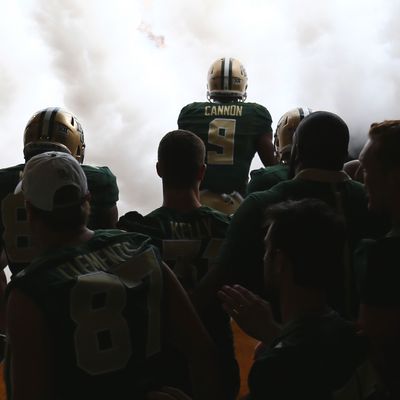
On the way to our interview, journalist and author Jessica Luther was seated next to an older couple on the train. They asked what she did, and she told them she was an author. Then, they asked what her book was about. “I said, ‘college football and sexual assault,’” Luther said. “And they immediately changed the subject.”
It’s an uncomfortable topic, and it’s one Luther has focused on her entire career, but her name was catapulted into the national spotlight in August 2015, when she broke the story about Sam Ukwuachu, a Baylor University football player who was then on trial for sexual assault. (He was eventually found guilty of second-degree sexual assault and served 180 days in jail.) Her work has appeared in numerous national publications, and in September it culminated in a book, Unsportsmanlike Conduct: College Football and the Politics of Rape.

In it, she details the steps universities usually take when one of their athletes is accused of sexual assault — “Nothing to See Here,” “The Shrug,” and “Moving On” — and examines the factors that make such suppression possible, such as institutional racism, the incredible amount of money at stake in college sports, and the culture of college football as a whole. Then, she offers solutions: Teach players about consent. Hire women. Hold coaches to a higher standard. On the eve of one of the biggest football weekends of the year, Luther talked to the Cut about how the stories she tells resonate in the wider world.
On what it’s like to be approached by sexual-assault survivors.
When I go on national television or have a big article published, it’s very common for survivors or their parents to contact me. I didn’t know anything about that before I started, but that’s where the inertia comes from — once you start writing about it, it’s hard to get out.
It’s hard to hold other people’s trauma. Of course, I recognize that it’s not nearly as hard as holding your own trauma. When I started writing about this, I knew survivors and I cared about this [issue], but now I couldn’t even put a number on the survivors who I know in some capacity. So it can be very hard, but it’s often very rewarding, too. It means something to me that people trust me with their story. Most of the time, when people contact me, they don’t actually want to go public with it. They’re not telling me because I’m a journalist — they’re telling me because they think I’m going to be kind to them. We live in a culture that so quickly diminishes and questions survivors, so when people find someone they feel is safe, they will reach out. And all they want is for you to validate what they’re telling you.
On what the rise of social media means for survivors.
I think we are in a time where we have an unmediated way to be in the public space. I’m always very encouraged when there’s a hashtag — when survivors talk to each other and to other people about their experiences and have that collective moment together.
[The Stanford sexual-assault survivor’s statement] was really important to a lot of survivors, and I don’t know if that statement would have been able to make the rounds the way that it did without social media. And in my experience, when one survivor comes forward, it gives another survivor the fortitude to come forward themselves. So it does feel different to me.
On the frustratingly slow pace of change.
It feels like forever ago that the Obama administration published its “Dear Colleague” letter outlining what they expect of schools that take money from the federal government. It was just five years ago, but it feels like a long time. At the same time, it took schools a while to react. It’s like trying to turn the course of a cruise ship — it takes a long time to go in a new direction.
For instance, at Baylor they’re funneling a bunch of money in right now, and it’s my understanding that it’s having a good on-the-ground impact. But we won’t know for a few years whether it actually changes the culture on campus. It’s hard as a journalist because you’re supposed to be responding to the moment, but it’s also hard to know that people are being harmed in the meantime. But these are really, really big things we’re trying to change, and there’s nothing we can do about the fact that it’s going to take time.
On how to write about sexual assault in sports.
Most of the time sports journalists think, This is happening to an athlete. And that sets the frame for them. Whereas when I hear about any of these stories, I think, What is this woman doing right now? I know for a fact that survivors will read what I write. So I’m really just advocating for expanding that potential audience to include women as well. When journalists center the story around the athlete, they tend to write out the violence. And sometimes, they don’t even write about the woman — they use the passive voice and literally write her out of the story.
I think it’s really important to write in the active voice because when you write about sexual violence in a passive voice, the reader doesn’t take it seriously as a crime. Word choice is also very important — I hate the word alleged. I hate the word claimed. I get that it’s a challenge to write this way, and I don’t care. I can expect people to do better.
On how sports can change the culture at large.
Right now, we’re having a national conversation about police brutality that’s being led by a bunch of athletes. That’s the weird paradox about sports: It’s an incredibly conservative space, but when it’s disrupted by someone who’s trying to be progressive, that has the ability to really push conversations in ways that other parts of our culture can’t.
Part of it is just telling athletes, “What you are doing is possibly damaging and hurtful to other human beings on this planet,” and hoping that that has an effect. I don’t know if it will, but I didn’t necessarily think that football players would be the ones raising their fists during the national anthem. So what if football changed? What if it did start there? That would be amazing.
This interview has been edited and condensed for clarity.




